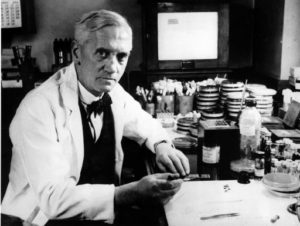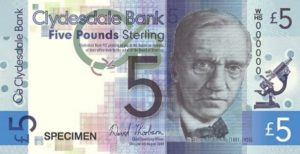
Sir Alexander Fleming was one of the most important scientists of the 20th century.
Fleming’s discovery of penicillin has had a tremendous impact on the world because penicillin became the basis for medication to treat bacterial infections.
Penicillin has saved millions of lives by stopping the growth of the bacteria that are responsible for poisoning the blood and causing many other once fatal diseases.
Fleming was born on 6 August 1881 in Darvel, Scotland, and died on 11 March 1955 in London.
World War 1
During World War 1, Alexander Fleming served as a captain in the Royal Medical Corps, working in the battlefield hospitals in France.
In France, Fleming saw large numbers of soldiers dying from infected wounds.
He realised that the antiseptics being used destroyed the patient’s immune system and didn’t effectively stop the invading bacteria.
Fleming set about trying to find anti-bacterial agents.
Alexander Fleming’s Road to Discovery
One day in 1928 he discovered that a mould (which was accidentally growing nearby) killed bacteria he had grown on a culture plate.
So, he isolated the mould and showed that it released a substance that inhibited bacterial growth.
He named the substance penicillin after the name of the mould.
Fleming reported his ground-breaking results in a scientific paper published in the British Journal of Experimental Pathology (1929).
World War 2
The scientists Howard Florey and Ernst Boris Chain built on Fleming’s findings and used them to mass produce penicillin to treat the wounded soldiers of World War 2.
Consequently, the antibiotic revolutionised battlefield medicine and, on a broader scale, the field of infection control.
Honours
1944 – knighted by King George VI.
1945 – Fleming (as well as Florey and Chain) received the Nobel Prize.
1999 – Time Magazine named Sir Alexander Fleming one of the 100 Most Important People of the 20th century.
2002 – Fleming named in the BBC’s list of the 100 Greatest Britons following a nationwide vote.



